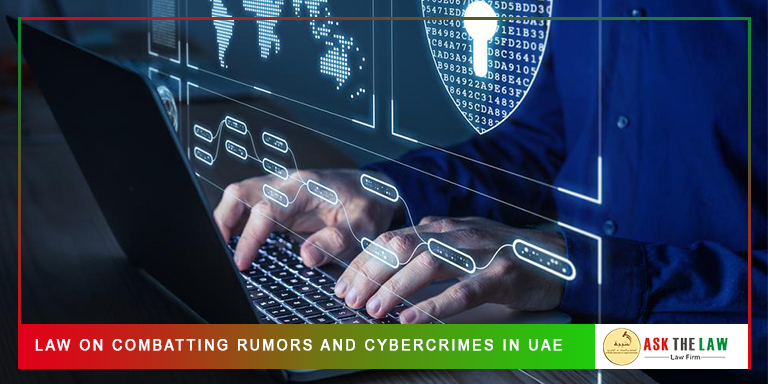
Law on Combatting Rumors and Cybercrimes in UAE
Countries are advancing in technology, and the United Arab Emirates (UAE) is not left behind when it comes to digital transformation. Dubai, the largest economic leader in the UAE, has several startup ecosystems where expats explore ideas for digitalization in the finance, transport, tourism, and energy sectors. As technology takes over the UAE’s thriving sectors, cybercrimes have also increased. For more details, you can also meet our lawyers in Dubai. Our lawyers in Dubai are the leading lawyers in United Arab Emirates.
Immediate Actions for Illegal Actions
Previously, the UAE did not need to make laws related to the internet and technology, but there has been too much misinformation across the IT sector, and it has to be resolved. People familiar with online banking systems receive scammed calls regarding their bank accounts. Many of them have fallen victim to cyber threats on social media platforms. The data protection policies at every portal are weak. Therefore, the UAE is working hard to create cybercrime laws and ensure an online safety net for users. For punishments and penalties, you can meet our lawyers in Dubai. Let’s explore this topic more.
Cybercrime Rules and Regulations in the UAE
The cybercrime laws in the UAE were introduced in 2006. From then on, the laws were revised over time, prioritising the matter of online safety for users. However, the increasing cybercrime rate has alarmed the authorities to make stringent laws and punishments for cybercriminals. The law serves the purpose of keeping users and individuals safe from cyber threats.
Aspects of the UAE Cybercrime Law
With the rise in scam calls and online threats, the UAE cybercrime law has strict policies and penalties. The following aspects of cybercrime law are taken into account when a case comes in the UAE:
- Unauthorised Access
A person who hacks the websites of the government, financial institutions, or any individual’s business will have to pay a heavy fine. In some cases, crime offenders are sent to jail.
- Transactional and Online Fraud
An individual impersonating another individual and making fraud calls to their contacts, asking for money, either on social media platforms or via phone call, will face severe penalties. These acts are strictly prohibited by UAE cybercrime law. Mostly, the older population falls for these types of scams, leading them to lose dirhams in big amounts.
- Cyber Extortion and Blackmail
Individuals are threatened online via email and social media accounts. There is zero tolerance for such crimes. Convicted individuals must also pay financial penalties and serve a prison sentence.
- Cases of Defamation on the Internet
Anyone making defamatory statements or attempting to character-assassinate an individual on the internet will be sent to jail. However, the law also protects the rights of companies. Hence, defaming any company is prohibited by the UAE cybercrime law.
- Invasion of Privacy and Data Protection
Any data stored online without the user’s permission is illegal. Companies should always ensure that users have consented to collect data through their websites. Moreover, companies should avoid putting up photos and videos of their clients without their permission if their product is even used.
UAE Creates Law to Combat Rumours
Due to the widespread cybercrimes and threats, the UAE government has taken an affirmative approach, ensuring that all the false information is received by the users online. There have been several key aspects to take into account for anti-rumour law:
- Spreading Fake News and Misinformation
Individuals publishing, sharing, or advertising false information that can negatively affect citizens or disrupt national security will be punished with a heavy financial penalty ranging between AED 100,000 and AED 1 million.
- Offences Made on Social Media
Misinformation should not be spread on social media platforms. The relevant authorities will close the accounts of the individuals carrying out those illegal activities, and they may have to face further legal consequences.
- Disruption and Negative Encouragement to Public
No content can be shared online in the UAE if it indicates hate speech, racism, violence, or protests against government policies. The UAE authorities monitor internet content, ensuring no harm is done to the general public or any institution (private or public).
- Wrong Use of Artificial Intelligence (AI)
Nowadays, individuals are creating fake images through AI and deepfake technology. This has harmed many individuals online who have posted their photos on social media. Such use of technology is manipulative. Therefore, the UAE government has ensured strict penalties for individuals involved in such cybercrimes.
Punishments for Violating Cybercrime and Rumour Laws in the UAE
The penalties in the UAE are very strict, no matter whether the offence has been made. The UAE government always tries to do justice in their matters. However, these punishments have different levels of severity, and that is how the crime offender is penalised in the UAE:
- Financial Penalty
Some fines can range from AED 50,000 to AED 10 million.
- Imprisonment
Serious crimes such as murdering someone or doing financial fraud could lead to imprisonment.
- Deportation
The expats involved in cybercrimes will be sent back to their own country and banned from the UAE.
- Blocking Websites
The UAE authorities in the cybercrime department have the leverage to block websites and accounts that may have misinformation or any content that violates the rules of the UAE cybercrime laws.
How to Avoid a Cyber Attack?
Businesses and individuals are attacked on their websites and social media platforms. In such cases, the UAE citizens should do the following practices to avoid cybercrime threats:
- Ensuring Correct Information
Before sharing any information received via WhatsApp or any social media platform, you must verify that it is true. Never spread any information that will lead to further confusion. Always verify information through government portals.
- Strong Data Protection Policies
Businesses must have strong data protection policies for their websites and users. Business owners must ensure that they have not shared any sensitive information with their users or asked for personal information from clients. The UAE government is trying to strengthen its cybercrime laws, but individuals should also exercise caution when using the internet.


